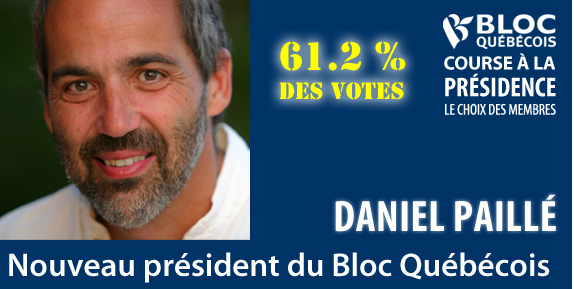Daniel Paillé’s election as the leader of the Bloc is a relatively good reflection of the kind of dark hole in which the Nationalists find themselves at this moment.
Paillé was one of the (few) golden boys of “Québec Inc” (the local bourgeois) who came in with Jacques Parizeau and Lucien Bouchard in the 1990s, more or less like François Legault, who now heads the rightwing Coalition pour l’avenir du Québec (CAQ). Paillé left the ship after Bouchard’s departure and made a late comeback with the Bloc ten years later as a Member of Parliament. He was defeated by the orange wave last spring.
However beyond his victory, the real story was that the election was a non-event in Quebec. Fewer than 15,000 people participated. Throughout the campaign, there was hardly any debate although Maria Mourani (one of the four Bloquistes remaining in Parliament), who was defeated by Paillé, did suggest a sort of left-wing turn. Pierre Paquette, the former leader in the House and an ex trade-unionist had wisely suggested to postpone this leadership campaign and instead redefine the goals and strategy of the Bloc. But to no avail.
According to recent polls in Quebec, the Bloc would not do any better if an election would be held right now. At the provincial level, the PQ is down to its lowest level since its electoral victory in 1976. The CAQ could win the next election (sometime in 2012), but Charest’s Liberals still have a hold on the anglophone minority and pockets of support here and there. And then there is the slow rise of Quebec Solidaire (QS), which is attracting those on the left and around 10% of public support.
The Nationalists are in a difficult position. They have two options. The option favoured by the leadership — who discretely sided with Paillé — is to stay put and hope that François Legault will be unable to hide his right-wing program for long, and begin to lose support. The tactical thinking is also that Charest will, in the end, be brought down by the many scandals plaguing his regime. So this option means saying as little as one can, and remaining more pro-establishment than less. This is a similar process to that used by Michael Ignatieff and the Liberal Party. We know what happened with this game!
The second option for the Block is to turn left. This is the approach suggested by Mourani and by those politicians who recently resigned from the PQ. It is not easy, especially given that the PQ has a lot of right-wing baggage. Another obstacle is the existence of QS.
One adaptation suggested by analysts like Le Devoir‘s Michel David is for the PQ to make a tactical alliance with QS, a kind of vote-sharing and riding-splitting where one Party would desist for the other. QS has a divided soul about the idea, although it could facilitate the election of five or six progressives to the National Assembly, which would make them a substantial force together with their popular leader, Amir Khadir. But Pauline Marois and other PQ luminaries think they can get away without leaving a door open to QS.
Apart from lack of new ideas and plenty of old reflexes, the PQ and the Bloc are faced with a structural twist whereas the traditional centre or even centre-left, not only in Quebec but in other capitalist countries, is squeezed. Keynesian policies, tainted or not with social-democracy, are a no-go with the establishment and here, “Quebec inc” (of which Paillé is an “organic intellectual”) is definitely hostile to going back to. They are indeed happy with Stephen Harper, whose agenda is to destroy what remains of the Keynesian compromise, even if it means diminishing Quebec as a state and society.
Faced with this, traditional political factions are jockeying to occupy the centre-right, but in that game, the PQ has many disadvantages compared to the Liberals or the CAQ.
For sure, Quebec politics are about to enter a turbulent era. The main positive element is the strength of the social movements, which have proven in the past that they can block neoliberal and neoconservative onslaughts.



